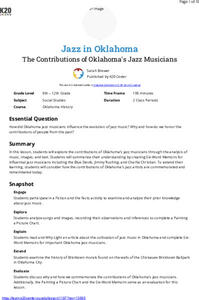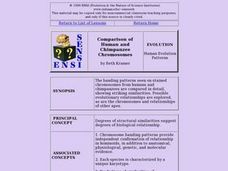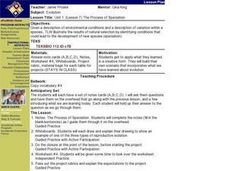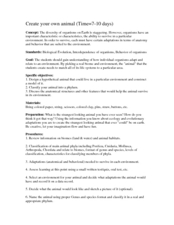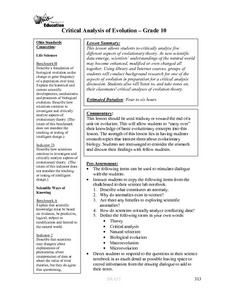Cold Spring Harbor Laboratory
Higher Cells Incorporate an Ancient Chromosome
Chromosomes contain keys to history including links from royalty to Neanderthals. Young scientists learn about Ivan Wallin's research into chromosomes with an animation and videos. Then, the concept connects to mysteries related to...
Smithsonian Institution
Singing for Justice: Following the Musical Journey of “This Little Light of Mine”
Scholars go on a musical journey to discover the origin, importance, and evolution of the song, "This Little Light of Mine". Class members boost their voice talents and clap to the beat while learning the lyrics in both English and Zulu....
K20 LEARN
Jazz In Oklahoma
When considering the possible hot spots of jazz in the United States, Oklahoma isn't the state that first comes to mind. However, it is the birthplace of several jazz musicians that influenced the evolution of the genre and Oklahoma City...
Curated OER
Artificial Selection
The second lesson in the series begins with a starter activity discussing wild versus domesticated animals. Then, scholars play a card game, with optional variations, to emphasize artificial selection. Next, they attend a field trip to a...
Curated OER
Physiological Adaptations
Students investigate the concepts of genetics and how it is tied to the variations found within different species and how it is tied to adaptations. They review the theory of evolution and factors found to help create variation. The...
Curated OER
Tree of Life
Pupils study genetics and evolution. They evaluate a group of organisms and estimate their genetic relatedness. Then they use an online program to check the accuracy of their estimations and make a branching phylogenetic tree which...
Curated OER
Atomic Structure in the Chemistry Classroom
Students are introduced to many of the scientists who contributed to the creation of the model of the atom. The changes to and evolution of the model over time is also covered. At the end of the lesson, Students differentiate between...
Curated OER
A Peek at the Past: Gradualism vs. Punctuated Equilibria
Students consider two sets of simulated fossils (caminalcules) that are provided as cutouts. They arrange them on two time scales. One set produces a visual example of gradualism, the other shows punctuated equilibria.
Curated OER
FOOTSTEPS IN TIME
Students measure and correlate their foot lengths and body heights, then use this data to estimate height of Laetoli hominids. They use metric measurement and graphing to determine these heights.
Curated OER
Comparison of Human and Chimpanzee Chromosomes
Pupils actively engage in the careful analysis of chromosome banding patterns and identify examples of inversion in homologous chromosomes.
Curated OER
The Ultimate Predator
Students already know that the most effective predator on earth today. They pay close attention, because after the teacher have finished lecturing, their assignment is to design a new "Ultimate Predator." Students present their...
Curated OER
The Opposable Thumb
Students participate in an activity which helps them realize the importance of the opposable thumb through trying to live without it. The goal of this activity is for students to understand the physical importance of the opposable thumb.
Curated OER
Genetic Jewels: Building the DNA Model
Students construct segments of DNA to create a piece of jewelry. In this genetics lesson students create a DNA sequence that they turn into something to wear.
Curated OER
What did T. rex taste like?
Students examine the three domains of life and explain that all living things share a common ancestor. In this paleontology instructional activity students are introduced to the process of illustrating evolutionary relationships.
Curated OER
Anthropology and Sociology
Learners examine the combined subjects of anthropology and sociology and explain how the disciplines would study the same issue. On poster board, they locate or draw pictures related to the two subjects. Once this is completed, students...
Curated OER
Comparative Embryology
Students compare and contrast the embryonic development of human, chicken and fish embryos. They create a detailed outline of similarities and differences among the three embryos at various stages of development.
Curated OER
Using A Winogradsky Column to Analyze Microbial Communities
Students use easily obtained materials to study ecological succession in a microbiological community. This investigation is appropriate for a variety of age groups. Elementary Students be fascinated by the changes occurring over time...
Curated OER
Understanding the Geologic Timescale
Students identify and analyze how the geologic time scale was developed by investigating 11 periods of time and the vast expanse of time of the Earth's existence. They study their period, determine the important factors indicative to...
Curated OER
The Process of Speciation
Students illustrate the results of natural selection by identifying conditions that could lead to the development of new species (speciation) based on a given description of environmental conditions and description of variation within a...
Curated OER
The Short Answer
Students examine the discovery of the Flores man. In this anthropology lesson, students discover details about the Flores man and the work of anthropologists. Students are challenged to create their own stories that explain Flores man.
Curated OER
Create Your Own Animal
Students design and create their own hypothetical animal. In this biology lesson, students identify the factors organisms need to survive. They classify their animals according to its correct phylum.
Curated OER
Critical Analysis of Evolution
Tenth graders discuss anomalies in nature and science. They discuss times that anomalies led to the collection of data that explained the phenomena and contributed to changing scientific understandings. Students work in groups to...
Curated OER
Studying Species by Examining the Evolution of the Canidae Family
Students examine the definition of species. Students complete a phylogentic tree of the Canidae family. They write an essay justifying why or why not wolves and dogs should be classified as different species.
Curated OER
How the Light Bulb Gets Switched On - The Evolution of Ideas
Pupils discuss how people are influenced by their cultures and backgrounds, make artwork that documents creative process, write character sketch of Colonel Massey from different points of view, examine issue from different perspectives...
Other popular searches
- Human Evolution
- Evolution Worksheet
- Theory of Evolution
- Evolution of Transportation
- Fossils and Evolution
- Adaptation and Evolution
- Evidence of Evolution
- Evidence for Evolution
- Evolution Charles Darwin
- Dog Evolution
- Biological Evolution
- Evolutionary Theorists




